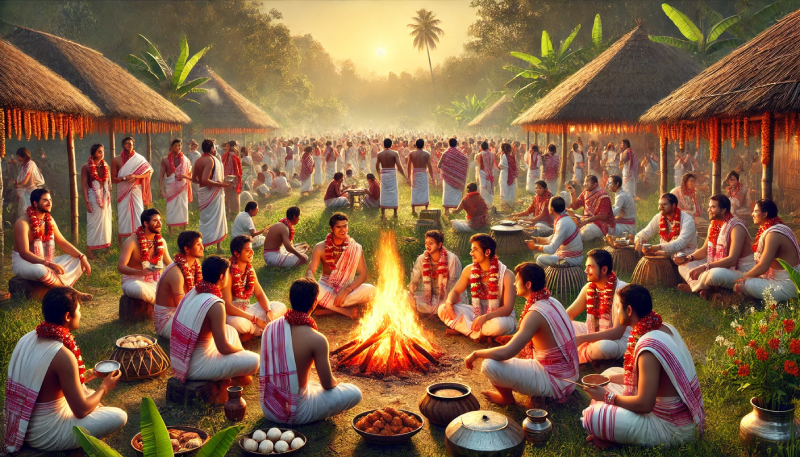Magh Bihu: A Celebration of Harvest and Togetherness
Magh Bihu, also known as Bhogali Bihu, is one of Assam’s most cherished festivals, celebrated in January to mark the end of the harvest season. The word “Bhogali” comes from the Assamese word “bhog,” meaning feast, which perfectly captures the essence of this festival—a time for food, fun, and festivities.
Magh Bihu is a festival that unites communities, as families and neighbors come together to share meals, light bonfires, and engage in traditional games. It is a celebration of gratitude for nature’s bounty and the bonds that tie people together.
Key Rituals and Traditions

Uruka (Feast Night):
- The festivities begin on the eve of Magh Bihu, known as Uruka. Families and friends gather for a grand feast, often featuring traditional Assamese dishes like fish curry, chicken, pork, and rice preparations.
- Community feasts are also common, with villagers contributing to a shared meal, creating an atmosphere of unity and joy.
Meji and Bonfire Rituals:
- Early on Magh Bihu morning, people build and light mejis, large bonfires made of wood and bamboo. The meji symbolizes the end of the harvest season and serves as a prayer to the fire god for prosperity and well-being.
- People offer rice cakes, pithas, and other foods into the fire as a mark of gratitude.
Pithas and Larus:
- Traditional Assamese sweets such as pithas (rice cakes) and larus (sweet balls made of sesame or coconut) are prepared and shared. These delicacies represent the festival’s theme of abundance and joy.
Magh Bihu Games and Activities
Magh Bihu is also a time for sports and cultural activities. Traditional games like buffalo fighting, egg fighting, and wrestling are organized in villages, drawing large crowds. Tug of war and running races add to the fun and excitement, engaging participants of all ages.
Cultural Significance
Magh Bihu holds immense cultural importance as it celebrates the hard work of farmers and the spirit of sharing. It also emphasizes the importance of community, as people come together to cook, eat, and celebrate.
- Connection to Nature: The festival highlights the strong bond between Assamese culture and the natural world, showcasing gratitude for a bountiful harvest.
- Unity and Togetherness: Magh Bihu fosters a sense of belonging, as it is a festival for everyone, irrespective of age, gender, or social status.
Modern Celebrations of Magh Bihu
While the core traditions remain intact, modern celebrations of Magh Bihu often incorporate cultural performances, music, and dance. Assamese communities worldwide host Magh Bihu events, bringing the joy of the festival to global audiences and ensuring the preservation of this cultural treasure.
Experience the Spirit of Magh Bihu
Magh Bihu is not just a festival; it is a heartfelt expression of gratitude, togetherness, and cultural pride. Whether you’re lighting a meji at dawn or sharing a plate of pithas with loved ones, Magh Bihu is a reminder of the joys of simplicity and the strength of community.
At Brihottor London Bihu, we bring the warmth and spirit of Magh Bihu to the Assamese diaspora and beyond, with traditional feasts, cultural programs, and activities that celebrate this beloved festival.
Come and be a part of the Magh Bihu festivities—where every flame of the meji and every bite of a pitha tells a story of abundance, love, and tradition.
Let’s unite to preserve the rich heritage of Assam for future generations.